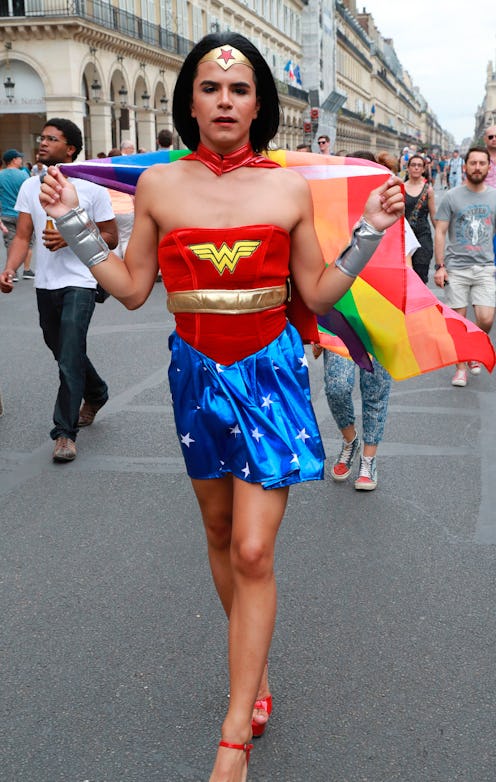
Last week, LGBTQ activist Gianna Collier-Pitts launched a Change.org petition to represent Wonder Woman’s Diana as bisexual when the film’s sequel hits theaters in 2019. And I’ve already signed it. I’ve been devouring comic book movies and TV shows since my parents introduced me to Lois & Clark: The New Adventures of Superman back in the ‘90s, but Wonder Woman is the first superhero movie that actually made me feel represented as an openly bisexual woman. Diana, according to writer Greg Rucka, is and has always been bisexual, but the fact that her sexuality is not explicitly represented in the films is hugely problematic for the LGBTQ community.
If DC would make Wonder Woman canonically bisexual in theaters, it would be a huge win for bi+ visibility. Plus, by recognizing Diana’s bisexuality in such a major way, the Wonder Woman franchise would get to empower queer superhero fans from all over the spectrum. As Collier-Pitts so aptly phrased it in her petition, “Making Wonder Woman canonically bisexual on the big screen would make her the first openly LGBTQ superhero of any gender from either DC or Marvel's cinematic universes, and would solidify her place as a true role model for women of all ages and identities.”
As exciting as all of this is for the LGBTQ+ community in general and this bi babe in particular, I know DC isn’t likely to out Wonder Woman on the silver screen until people stop questioning if Diana is “really” bisexual. And they really should stop, because just like my identity, Diana’s sexuality isn’t even up for debate in the first place.
Since Diana’s homeland is inhabited entirely by women, her queerness really should make sense to audiences. As Rucka told Comicosity about Themyscira back in 2016: “It’s supposed to be paradise. You’re supposed to be able to live happily. You’re supposed to be able — in a context where one can live happily, and part of what an individual needs for that happiness is to have a partner — to have a fulfilling, romantic and sexual relationship. And the only options are women.” Rucka continued, “Now, are we saying Diana has been in love and had relationships with other women? The answer is obviously yes.”
Bisexual erasure is psychologically harmful, and representation is power. These are facts. Hell, its why three Americans started Bi Visibility Day back in 1999, and it’s also part of the reason GLAAD and BiNet USA created Bi Awareness Week in 2014. Our society as a whole needs to see bisexual characters who are allowed to date, love, sleep with, and ultimately choose a partner of any gender without having their identity called into question. We need to see more bisexual couples, both monogamous and poly. We need to see more proudly bisexual male characters represented in mainstream media as well, because bisexual erasure hurts bi men. Actually, bisexual erasure hurts everyone, which is precisely why it needs to stop.
When it comes to film, bisexual people are usually underrepresented, wildly misrepresented, or both. And when it comes to real life, bisexual women in particular face all sorts of unique challenges, many of which stem from biphobia, isolation, and a lack of positive representation. As Collier-Pitts explained it in her petition, “We are oversexualized and underrepresented. We are called greedy, dishonest, and confused. We are the least likely to come out and the most likely to suffer from depression and anxiety, on top of experiencing higher rates of sexual/intimate partner violence. We are made to feel invisible and in doing so we begin to see ourselves as invisible.”
It took me nearly 27 years to fully come out as a bi woman, and I think a lack of positive representation absolutely played a role in that. I can only imagine what it might be like to see an openly bisexual female superhero filling up theaters across America, but hopefully I won’t be able to say that anymore come December 2019.